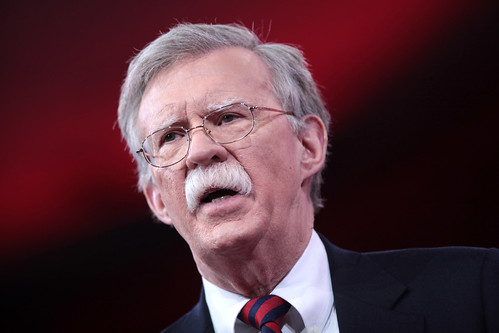From Truthdig
John Bolton has never made a secret of his burning desire to stoke a war between the United States and Iran. But Bolton is not the only one on Donald Trump's national security team who dreams of such a military confrontation. Secretary of State Mike Pompeo has joined with Bolton in recent months to prepare a case for possible war with Iran.
The tactics used by Pompeo and Bolton bear a strong resemblance to those pursued by Dick Cheney when he pushed for an attack on Iran from 2004 to 2007. Like Cheney, Pompeo and Bolton have sought to generate a phony crisis over Iranian "proxies" in Iraq, and have created the equivalent of a myth of an Iranian covert nuclear weapons program by conjuring up a nonexistent Iranian intercontinental ballistic missile (ICBM) threat.
When the plan for unprecedented economic sanctions on Iran was unveiled in May 2018, along with Trump's announcement that he was pulling out of the Joint Comprehensive Plan of Action -- commonly known as the Iran nuclear deal -- the administration denied that its objective was regime change. As Pompeo put it, Trump was "ready, willing and able to negotiate a new deal."
The Trump White House has taken advantage of Trump's diplomacy with North Korean leader Kim Jong Un to sell the idea that he's willing to negotiate a new relationship with Iran. In July, Trump said of the Iranians, "[A]t some point, they're going to say 'let's make a deal.' "
But the demands on Iran that accompany the administration's pressure campaign belie the notion that its objective is to reach a new agreement. The key demands outlined by Pompeo on May 21, 2018, are clearly based on the policy agenda of Israeli Prime Minister Benjamin Netanyahu. It's an agenda for regime change and war, not a new deal with Iran.
At the top of Pompeo's list are demands that Iran end its support for Hezbollah, including its supply of ballistic missiles to the Lebanese Shiite organization, and the "halt [to] further launching or development of nuclear-capable missile systems."
Those demands reflect an extraordinary agreement in December 2017, reported in the Israeli press, between the Trump administration and the Netanyahu government on a joint strategic work plan that included precisely those points on Pompeo's list -- countering Iranian ballistic missile development, as well as the supply of more accurate missiles to Hezbollah through Syria.
The consequences of enforcing such demands would be a dangerous destabilization of the already tense military standoff between Israel and Iran. Iran now depends on a combination of its own ballistic missiles and Hezbollah's ability to retaliate against Israel to deter an Israeli, Saudi or U.S. attack on its homeland. To agree to stop testing its own missiles to improve their accuracy and supplying Hezbollah with accurate weapons would allow Israel, which has long wanted to destroy Hezbollah's military capability, to degrade Hezbollah's deterrent over time through its own missile strikes. The net result would be to leave Iran with a seriously degraded deterrent, especially in light of Israel's modern missile defense system.
No Iranian leader, regardless of ideology, could survive politically after agreeing to such demands, as any intelligence analyst worth his or her salt has pointed out in recent months. Those clearly nonnegotiable demands give away the real aim of the Trump administration to bring about regime change. Instead of relying entirely on internal Iranian dynamics to topple the regime, the administration's Iran strategy has now begun to resemble the one pursued by Cheney and the neoconservatives, who sought an excuse to provoke war with Iran during the George W. Bush administration.
Threatening War Over Harmless Incidents
In September, the response of Bolton and Pompeo to incidents in Iraq involving a few rockets that reportedly fell in the vicinity of U.S. diplomatic posts in Baghdad provides insight into their concept of regime change. Bolton requested retaliatory options from the Pentagon, which responded with a set of options that included a raid on an Iranian military facility, according to The New York Times.
But senior U.S. military officials were alarmed at Bolton's apparent promotion of such a retaliatory strike, which they feared could either start a war with Iran or result in the complete expulsion of U.S. military personnel from Iraq. "People were shocked," one former administration official said. "It was mind-boggling how cavalier they were about hitting Iran."
But it wasn't only Bolton who seized on the incident to lay the political basis for a possible strike against Iran. In a Sept. 21 interview with CNN, Pompeo said, "We will not let Iran get away with using a proxy force to attack American interests. If they are responsible for the arming and training of these militias, we will go to the source."
And in a Foreign Affairs magazine article in October, Pompeo claimed that Iranian "proxies" had "launched [a] life-threatening rocket attack against the U.S. embassy compound in Baghdad and the U.S. consulate in Basra." He declared that the administration would "respond swiftly and decisively in defense of American lives" if such an attack were to result in injury to U.S. personnel or damage to U.S. facilities.
(Note: You can view every article as one long page if you sign up as an Advocate Member, or higher).






